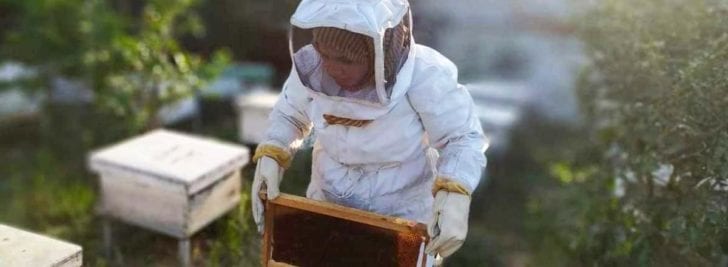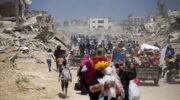Samar al-Bu’, 28, from Beit Hanoun (Photo: via B’Tselem)
At this very moment, hundreds of thousands of women and girls are dealing with stifling unemployment and unbearable living conditions caused by Israel’s blockade and invasions. Please read five incredible Gazan women’s stories of survival.
reposted from B’Tselem
In 2012, the United Nations predicted that unless Israel took significant measures to improve the humanitarian situation in the Gaza Strip, the area would be unlivable by 2020.
Here we are, in 2020, and Gaza has been unfit for human residence for quite some time. It is governed by scarcity and despair. 65% of Gaza’s population is made up of young adults under the age of 24, who are living in an intolerable present, with no hope for a better future.
Israel shrugs off its responsibility for creating the reality in Gaza and refuses to change the policies that have led to the current situation. Meanwhile, two million people are living in unbearable, dangerous conditions, trapped within 140 square miles, with no prospect for change.
According to the World Bank’s latest report, over the last two years the situation in Gaza has deteriorated even further, primarily due to Israel’s blockade of almost 13 years. The blockade has driven Gaza’s economy into a state of collapse, trapping residents in an isolated and restricted job market with no opportunities and a dismal future. According to the Palestinian Central Bureau of Statistics, 57% of the population in Gaza lives in poverty and 36% in extreme poverty, as derived by a formula based on consumption levels. Gaza has a 42.7% unemployment rate, while the unemployment rate among women has reached 57.3%.
Wars and military operations have destroyed the infrastructure in Gaza due to a combination of Israeli airstrikes, a prohibition on importing spare parts, and inability to build new infrastructure as imports of construction material are severely limited. Residents suffer an extreme shortage of water, a minimal supply of electricity and barely-functioning sewage systems. Israel’s repeated airstrikes have demolished thousands of homes and left tens of thousands of families homeless. Recovery is a slow and painful process.
At this very moment, hundreds of thousands of women and girls are dealing with stifling unemployment and unbearable living conditions. To mark International Women’s Day, B’Tselem has chosen to share the voices of five women and their stories of coping with an impossible reality forced upon them.
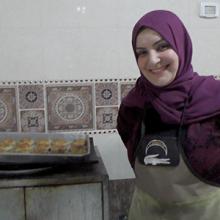
Khulud Zaqut, 31, from a-Nasser neighborhood in the Gaza Strip, is a mother of four. After years of barely making ends meet, Khulud decided to change her reality: she put on an apron and started baking. She makes traditional cakes and sweets and pastries filled with spinach and meat. Despite frequent power cuts and a shortage of cooking gas in Gaza, she started “Khulud’s Kitchen for Desserts and Baked Goods”. She markets her products on Facebook.
Made in Gaza: A hobby turns into a lifeline
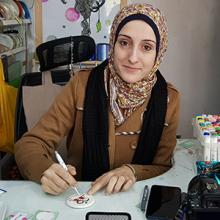
While other artisans can travel, participate in fairs and get inspired by new ideas – Dima Sha’sha’ah, 30, is an unemployed accountant who was forced to come up with an alternative source of income, and has had to make do with sharing her handiwork on Facebook. Her brother, Hamdi, is in the same boat.
Bees without borders: Continuing her father’s legacy
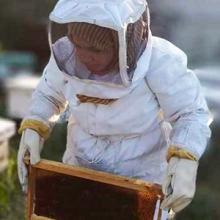
Samar al-Bu’, 28, from Beit Hanoun, studied education and hoped to become a teacher. After graduating from university and spending the following two years looking for work in her field, Samar gave up and started seeking another source of income. She managed to secure funding from the German International Development Fund to set up 50 beehives. She now harvests the honey. Despite the stifled economy in Gaza, the teargas canisters fired at March of Return protestors (and at the beehives), and the lack of flowers for the bees – she is flourishing, against all odds.
From a university graduate with big dreams to a sheep farmer surviving an impossible reality
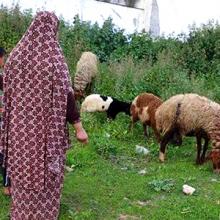
She had 10 children and had hoped to watch them grow in good health and happiness. She graduated university with a degree in Arabic and Geography Studies and had hoped to find steady work in civil service or at UNRWA. Yet life had other plans for A.H., 47, from Beit Lahiya: her husband went blind due to diabetes and could no longer support the family. To survive, she started raising livestock and earning a living off their produce.
Dreaming of harvest in a warzone
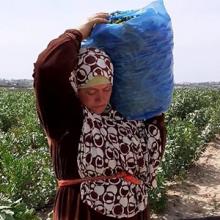
Intesar a-Najar, a 53 year old farmer from the town of Jabalya in the Gaza Strip, is a mother of 11 children and the sole breadwinner in the family. Time and again, Israel destroyed her plot of land; time and again, Intesar replanted, watered, picked and served. Her husband cannot work as he has severe chronic illnesses and has had limited mobility following an injury from Israeli shelling in 2008. Intesar runs between her plot of land and her kitchen, where she makes couscous for sale.
RELATED READING:
Is Israel an apartheid state? Rhetoric or reality
Gaza Women’s March – News Roundup
Administrative Torture: Free Heba al-Labadi, a Jordanian Citizen in Israeli Prison

